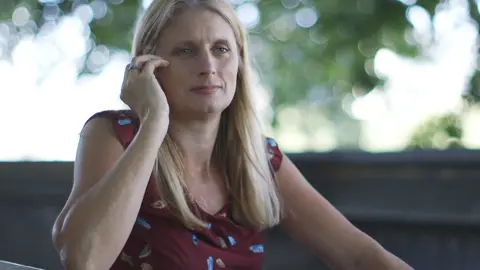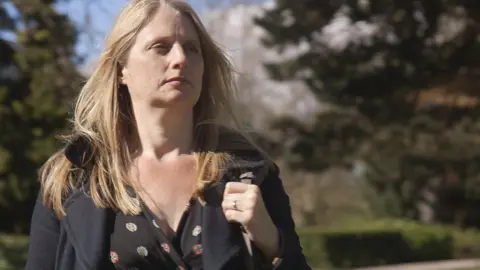'Without suicide forums, Callie might still be alive'
 BBC / Panorama / Getty
BBC / Panorama / GettyLike a lot of people her age, Callie Lewis loved animals and posting videos she'd made of herself on YouTube and Tumblr.
But Callie, who was diagnosed with Asperger's syndrome at a young age, struggled with chronic depression and suicidal thoughts.
"Callie was passionate about animal rights, she would always say that she much preferred animals to people," recalls her mum, Sarah Lewis.
She was just 24 when she took her own life.
Now, a new Panorama documentary tells Callie's story, looking at the role suicide forums played in her death and challenging the NHS over, what they have acknowledged as, failings in Callie's care.
It wasn't until just over a month before her death that Callie started chatting with strangers in online suicide forums.
These are corners of the internet where people discuss suicide and in some cases, share information on how someone can end their own life.
In posts on one suicide forum, Callie told other users about failed attempts to take her life. In another, she asked for help hiding her intentions from mental health professionals.
'Engrossed' in suicide websites
After hanging out on the forum, Callie discovered a new suicide method and even bought a "suicide kit", which she later used to end her life.
Callie's mum believes the website played a significant role in her daughter's death in August 2018.
She went to stay in Windermere, Cumbria - 350 miles away from her mum - where she remained for several days before taking her life.
"Without those forums, I think my daughter would have struggled to find the information that she was looking for about how to die," Sarah says.

She found out that Callie had been using them after one of her daughter's close friends, Jan - a former special needs teacher - alerted her out of concern for Callie's safety.
According to Jan, Callie had become "engrossed" in suicide websites which were "encouraging her how to do it".
Jan says Callie cut ties with him in the run-up to her death. "She felt that if she communicated with me she wouldn't be able to do it, but if she cut me off and communicated with them they would make sure she did it."
"When we found out about the suicide website she'd been on, that set off an alarm bell - it began to feel like an obsession," says Callie's granddad, Graham Lewis.
After stopping communication with family and friends before her death, the last people Callie spoke to were the forum users.
Instead of trying to get her help, they encouraged her to take her own life.
"Good luck. We all wish you a swift travel," wrote one. "May you find peace, my friend," said another.
'Bury these sites'
"In the UK, we show the Samaritans' 24-hour helpline number to connect people who are depressed, suicidal or in distress with the help and advice they need as quickly as possible," say Google's guidelines, which were sent to Newsbeat.
"We remove pages from our index in limited circumstances, including when required by law.
"We do not believe it is our role to decide what people should be able to find on the web, but we encourage broader debate about this topic so that societies can collectively make these decisions."

Information and support
If you or someone you know needs support for issues about emotional distress, these organisations may be able to help.

The government says that "more needs to be done to tackle the promotion of self-harm and the targeting of vulnerable people online" and adds that it is "developing world-leading laws to put a new duty of care on online companies towards their users".
It has formed a partnership of suicide prevention experts that includes the Samaritans and is working with online companies.
The Samaritans want to find ways to "bury" sites like the ones that Callie was using before her death, to make them hard to find on online search engines.
"We don't want that popping up on the first pages of searches," says Jacqui Morrissey, a spokeswoman for The Samaritans.

"If we can't get rid of it, let's try and bury it, let's make it difficult to find for people so that when they are looking for information what they're coming across is the helpful supportive information first and foremost."
But the people who run the website she used deny that their platform encourages anyone to end their life.
"We offer a space to discuss the topic of suicide without censorship," they told us via text message.
"Our community and website does not encourage suicide. That is strictly against the rules."
When asked about concerns over giving forum users access to detailed methods of killing themselves, they responded: "Information is power… What you do with it is your responsibility."
"They are kidding themselves, if they think that actually, these are helpful forums," says Callie's mum, Sarah.
Always another way
"One of the things we hear from families often is that there are so many missed opportunities to save their loved ones," says Ms Morrissey.
"What we'd say to anyone who's struggling to cope is suicidal feelings are temporary. They may not feel it at the time but they will pass and there is support available. There is always another way."
But the support Callie needed was hard to come by. Despite her mum's efforts to get help from the NHS a series of errors meant she became lost in the system.
The last time Sarah saw Callie, was at a train station. Desperately worried about her daughter, Sarah had called the police. When there was no mental health bed available for Callie that night, she spent the night with officers in a police car.
Callie had a mental health assessment the next morning but denied having any immediate intention of wanting to kill herself. She'd already asked forum users for advice on convincing NHS staff she was OK before the assessment.
 Getty Images
Getty ImagesShe also told mental health professionals that she didn't want her mum to be given any information about her treatment as she was over 18.
Callie's care was then taken over by her local Community Mental Health Team, who called Callie three times and got no response.
Rules say when this happens, someone must visit the person at home - but this didn't happen. The person assigned to be Callie's case worker then went off sick. No one was appointed to take over Callie's case.
It took 13 days before Kent and Medway NHS Trust realised Callie had gone missing and in that time, she had killed herself.
"I kept her safe all her life and then the moment I asked for help she stops being safe and that's just very hard for me to come to terms with, I feel I made the wrong decision," says Sarah.
"It's the thought of her just wondering around by herself lost and, nobody able to help her.
"That really upsets me. I just needed to know that somebody somewhere was caring for her and nobody was and I wasn't able to."
'We failed Callie'
Kent and Medway NHS Trust told Panorama it was "deeply saddened by Callie's tragic death".
"We failed to provide Callie with the standard of care that she and her family should have expected and we apologise unreservedly for this," it said in a statement.
The trust told Panorama it has improved its operating procedures and staffing levels.
An inquest into Callie's death concluded that there had been a number of individual and organisational failures in her care amounting to gross failure. Sarah says she is "really grateful that they listened and acknowledged that her death could have been avoidable".
Now, Sarah wants Callie to be remembered for more than "just her illness."
"She did sometimes talk about ending her life but until those final few weeks I never thought she'd actually do it. I used to imagine her still alive at 90 surrounded by cats and cups of tea probably still saying she wanted to die."
"I really do believe that her mind was one that could change the world if only the world was more accepting of people who are a little different," Sarah said at Callie's funeral.
"She would never have fitted in any normal mould, but we did love her unconditionally."
You can watch Failed by the NHS: Callie's Story on BBC1 at 20:30 on Monday night or on BBC iPlayer.


